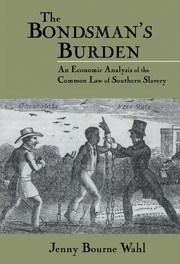Book contents
- Frontmatter
- Contents
- Acknowledgments
- 1 American Slavery and the Path of the Law
- 2 The Law of Sales: Slaves, Animals, and Commodities
- 3 The Law of Hiring and Employment: Slaves, Animals, and Free Persons
- 4 The Law Regarding Common Carriers: Slaves, Animals, Commodities, and Free Persons
- 5 The Law Regarding Governments, Government Officials, Slave Patrollers, and Overseers: Protecting Private Property versus Keeping Public Peace
- 6 The Legal Rights and Responsibilities of Strangers Toward Slaves, Animals, and Free Persons
- 7 Treatment of One's Slaves, Servants, Animals, and Relatives: Legal Boundaries and the Problem of Social Cost
- 8 The South's Law of Slavery: Reflecting the Felt Necessities of the Time
- Notes
- Index
5 - The Law Regarding Governments, Government Officials, Slave Patrollers, and Overseers: Protecting Private Property versus Keeping Public Peace
Published online by Cambridge University Press: 24 October 2009
- Frontmatter
- Contents
- Acknowledgments
- 1 American Slavery and the Path of the Law
- 2 The Law of Sales: Slaves, Animals, and Commodities
- 3 The Law of Hiring and Employment: Slaves, Animals, and Free Persons
- 4 The Law Regarding Common Carriers: Slaves, Animals, Commodities, and Free Persons
- 5 The Law Regarding Governments, Government Officials, Slave Patrollers, and Overseers: Protecting Private Property versus Keeping Public Peace
- 6 The Legal Rights and Responsibilities of Strangers Toward Slaves, Animals, and Free Persons
- 7 Treatment of One's Slaves, Servants, Animals, and Relatives: Legal Boundaries and the Problem of Social Cost
- 8 The South's Law of Slavery: Reflecting the Felt Necessities of the Time
- Notes
- Index
Summary
To keep the peace of Southern society, slaveowners relinquished to others a certain amount of control over slaves. Sheriffs, constables, and jailors had some authority over others' slaves, just as they had over others' lives and possessions generally. But these public officials were not the only persons legally entitled to supervise slaves. In lieu of a standing police force, many Southern states established citizen patrols to keep order. Slave patrols might be thought of as a way of institutionalizing the “hue and cry,” an old English practice that required bystanders to shout loudly when a felon escaped and to pursue the criminal until he was caught. The object of pursuit differed, of course: Southern patrollers often hunted those whose only “crime” was attempting to escape a life of bondage. Besides providing for public control of slaves, Southerners also granted some power to private individuals, particularly overseers.
By comparison to present-day disputes, nineteenth-century plaintiffs (slaveowners and otherwise) were more likely to sue – and to recover damages from – public officials rather than the government itself. As the first section reveals, governments hid behind a shield of sovereign immunity, whereas local officials (particularly sheriffs) faced personal liability if they negligendy caused injuries. The second and third sections show that slave patrollers and overseers faced duties of care similar to those of local officials. Although I cannot say for sure that these legal rules were efficient, I suggest that sovereign immunity coupled with private responsibility of public officials probably suited the antebellum system of law and order better than it would fit today's regime.
- Type
- Chapter
- Information
- The Bondsman's BurdenAn Economic Analysis of the Common Law of Southern Slavery, pp. 101 - 119Publisher: Cambridge University PressPrint publication year: 1997



